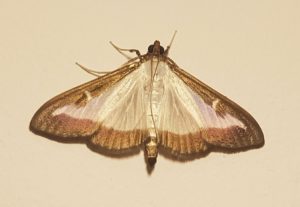Recent confirmation of the presence of Box Tree Moth (BTM) in the United States has prompted IR-4’s Environmental Horticulture Program to respond with information for growers to help identify and eradicate the pest.

In May, the Canadian Food Inspection Agency confirmed the presence of BTM at a nursery in Ontario. On May 26, the U.S. Department of Agriculture, through a federal order, prohibited the import of boxwood, holly and euonymus plants from Canada. While tracking and inspecting plants for the pest, the USDA’s Animal and Plant Health Inspection Service (APHIS) on May 28 confirmed the presence of BTM in at least three states on plants that had already been shipped to the U.S. by the Canadian nursery.
In an effort to help with eradication of the pest, IR-4’s Environmental Horticulture team along with Dan Gilrein of the Cornell University Cooperative Extension of Suffolk County and Steve Frank of NC State University prepared a mitigation guidance document. The document is designed for nursery and landscape professionals to help them identify BTM and select appropriate pest management tools for their eradication.
“The Box Tree Moth is an invasive pest that can cause severe damage and ultimately kill boxwood plants that are commonly planted at homes and in public spaces,” said IR-4 Environmental Horticulture Program Manager Cristi Palmer. “By providing resources and information to nursery and landscape professionals, we can increase the chances of spotting and eradicating BTM before they can spread further.”
The document is part of larger, multi-institutional efforts among the IR-4 Environmental Horticulture Program at Rutgers University and collaborators at USDA-APHIS, Cornell Cooperative Extension, NC State University, and several state departments of agriculture to analyze the movement and mitigation of BTM in the United States. Funding for these efforts have been made possible through the USDA-APHIS’s Plant Protection and Quarantine Program and the 2018 Farm Bill.
About the IR-4 Project
Established in 1963, the mission of the IR-4 Project is to facilitate regulatory approval of sustainable pest management technologies for specialty crops and specialty uses to promote public well-being. To learn more, visit our website.
